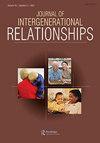Resilience and Social Support as Resources for Kinship Caregivers Who are Coping with COVID-19
IF 1
Q3 GERONTOLOGY
引用次数: 0
Abstract
ABSTRACTThis study explored the roles of social support and resilience in understanding the impact of barriers to needed services as well as the impact of COVID-19 on kinship caregivers’ efforts to care for themselves. Based upon a sample of 135 kinship caregivers, analyses suggested that social support and resilience mediated barriers to service – self-care relationships as well as impact of COVID-19 – self-care relationships, subject to whether overall impact or physical/mental health-relational impact was considered. These findings help to understand why some kinship caregivers are more adept at meeting their own self-care needs than are others during COVID-19 and have implications for enhancing resilience and social support among kinship caregivers in the face of COVID-19.KEYWORDS: Kinship careresiliencesocial supportgrandparents Disclosure statementNo potential conflict of interest was reported by the authors.Contribution to the FieldThis paper identifies the key roles that personal resilience and social support play in impacting kinship caregivers’ response to the pandemic. It moreover contextualizes not only COVID-19 impact but also self-care in understanding relationships between both barriers to service and virus impact on self-care as a response to the COVID-19 lockdown. Findings have implications for capitalizing on the strengths that kinship caregivers bring in coping with the pandemic.Additional informationFundingThe work was supported by the William Penn Foundation.韧性和社会支持是应对COVID-19的亲属照顾者的资源
摘要本研究探讨了社会支持和韧性在理解所需服务障碍的影响以及COVID-19对亲属照顾者自我照顾努力的影响中的作用。基于135名亲属照顾者的样本,分析表明,社会支持和复原力介导了服务-自我保健关系的障碍以及COVID-19 -自我保健关系的影响,但取决于是否考虑了总体影响或身体/心理健康相关影响。这些发现有助于理解为什么在COVID-19期间,一些亲属照顾者比其他人更善于满足自己的自我照顾需求,并对增强亲属照顾者面对COVID-19的复原力和社会支持产生影响。关键词:亲属关系职业弹性社会支持祖父母披露声明作者未报告潜在利益冲突。对该领域的贡献本文确定了个人复原力和社会支持在影响亲属照顾者应对大流行方面发挥的关键作用。此外,作为对COVID-19封锁的回应,它不仅将COVID-19的影响置于背景中,还将自我保健置于背景中,以了解服务障碍和病毒对自我保健的影响之间的关系。研究结果对利用亲属照顾者在应对大流行方面的优势具有重要意义。这项工作得到了威廉佩恩基金会的支持。
本文章由计算机程序翻译,如有差异,请以英文原文为准。
求助全文
约1分钟内获得全文
求助全文
来源期刊

Journal of Intergenerational Relationships
GERONTOLOGY-
CiteScore
2.80
自引率
14.30%
发文量
31
期刊介绍:
The Journal of Intergenerational Relationships is the forum for scholars, practitioners, policy makers, educators, and advocates to stay abreast of the latest intergenerational research, practice methods and policy initiatives. This is the only journal focusing on the intergenerational field integrating practical, theoretical, empirical, familial, and policy perspectives.
 求助内容:
求助内容: 应助结果提醒方式:
应助结果提醒方式:


